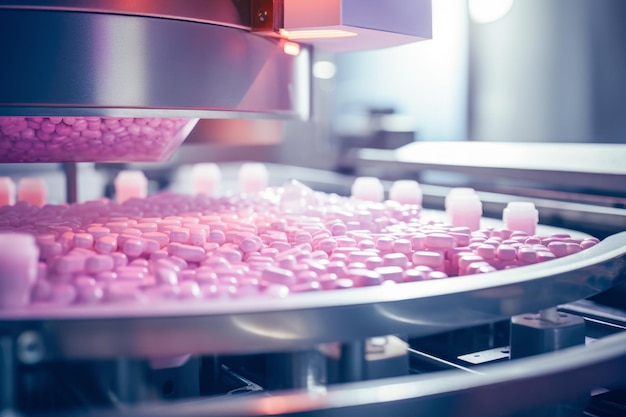Merck's $1 Billion Investment: A New US Factory For Key Drug Production

Table of Contents
The Strategic Importance of Domestic Drug Manufacturing
The US pharmaceutical industry's heavy dependence on foreign sources for drug production has long been a cause for concern. This reliance creates several vulnerabilities, including:
- Supply chain disruptions: Geopolitical instability, natural disasters, or pandemics can easily disrupt the flow of essential medications.
- Price volatility: Fluctuations in international markets can lead to unpredictable price increases for crucial drugs.
- Intellectual property concerns: Manufacturing abroad can increase the risk of intellectual property theft.
Reshoring drug production offers significant advantages:
- Enhanced supply chain security and resilience: Domestic manufacturing reduces vulnerability to global events, ensuring a consistent supply of essential medicines.
- Reduced reliance on international markets: This minimizes the impact of geopolitical tensions and trade disputes on drug availability.
- Faster response to public health emergencies: Domestic production allows for quicker responses to outbreaks and crises, providing vital medications swiftly.
- Stimulation of job growth and economic benefits: New facilities create numerous high-skilled jobs, boosting local and national economies.
The US government has also recognized the strategic importance of domestic drug manufacturing. Initiatives such as the [mention specific relevant government programs or acts here, e.g., Investing in American Jobs Act] aim to incentivize companies to bring manufacturing back to the US, supporting Merck's investment and potentially encouraging similar ventures from other pharmaceutical giants.
Details of Merck's New US Factory
Merck's new facility, located in [State, City – use location-based keywords, e.g., "the vibrant biotech hub of Boston, Massachusetts"], is projected to create [number] high-paying jobs for skilled workers in the region. The plant will focus on the production of key drugs including [list specific drug names and their therapeutic areas, e.g., "Keytruda (a cancer immunotherapy) and Gardasil (a human papillomavirus vaccine)"]. These are vital medications addressing critical healthcare needs, underscoring the importance of this investment.
The factory will incorporate cutting-edge manufacturing technologies, including:
- Advanced automation systems for increased efficiency and precision.
- Artificial intelligence (AI) for real-time process optimization and quality control.
The facility is expected to reach full production capacity by [year], significantly bolstering the domestic supply of these critical medications. Merck is collaborating with [mention any partners or collaborators involved in the project, e.g., "local universities and technology firms"] to leverage expertise and resources in this ambitious undertaking.
The Economic and Social Impact of Merck's Investment
Merck's $1 billion investment will yield substantial economic benefits, both locally and nationally. This includes:
- Direct job creation: The factory will directly employ hundreds of workers in skilled positions.
- Indirect job creation: Supporting industries, such as logistics and transportation, will also see a boost in employment.
- Economic stimulus: The increased economic activity will benefit the local community and the broader US economy.
Beyond economic benefits, the project's impact on healthcare access and affordability is significant. Increased domestic production can potentially lead to:
- More stable drug pricing, mitigating the impact of global market fluctuations.
- Improved access to essential medications for patients across the country.
Merck has committed to incorporating sustainable practices in the factory's operations, minimizing its environmental footprint through [mention specific environmental considerations, e.g., "energy-efficient technologies and waste reduction initiatives"].
Long-Term Implications for the Pharmaceutical Industry
Merck's substantial investment could serve as a catalyst for other pharmaceutical companies to reconsider their manufacturing strategies. This shift towards domestic production could:
- Increase competition within the US market, potentially leading to lower drug prices.
- Strengthen the US's position in global pharmaceutical manufacturing.
- Lead to renewed focus on domestic healthcare policy and regulation.
Securing the Future of US Drug Production through Merck's $1 Billion Investment
Merck's $1 billion investment in a new US drug manufacturing facility marks a significant step towards securing the future of US drug production. This investment not only addresses critical supply chain vulnerabilities but also promises substantial economic and social benefits, stimulating job growth and improving access to essential medications. The project underscores the importance of domestic pharmaceutical manufacturing and its impact on national healthcare security. Learn more about Merck's commitment to securing the future of US drug production and explore the benefits of domestic pharmaceutical manufacturing. [Link to Merck's website and other relevant resources]

Featured Posts
-
 Chris Kaba Panorama Police Watchdog Files Ofcom Complaint
Apr 30, 2025
Chris Kaba Panorama Police Watchdog Files Ofcom Complaint
Apr 30, 2025 -
 Pacers Vs Cavs Game Schedule How To Watch Predictions And Analysis
Apr 30, 2025
Pacers Vs Cavs Game Schedule How To Watch Predictions And Analysis
Apr 30, 2025 -
 Troops Dismantle 35 Illegal Refining Sites Apprehend 99 Suspects In One Week
Apr 30, 2025
Troops Dismantle 35 Illegal Refining Sites Apprehend 99 Suspects In One Week
Apr 30, 2025 -
 Coronation Street Stars Emotional Farewell Jordan And Fallons Thank You Update Leaves Co Star In Tears
Apr 30, 2025
Coronation Street Stars Emotional Farewell Jordan And Fallons Thank You Update Leaves Co Star In Tears
Apr 30, 2025 -
 How To Watch Cavaliers Vs Heat Nba Playoffs Game 2 Live Stream Tv Schedule And More
Apr 30, 2025
How To Watch Cavaliers Vs Heat Nba Playoffs Game 2 Live Stream Tv Schedule And More
Apr 30, 2025
